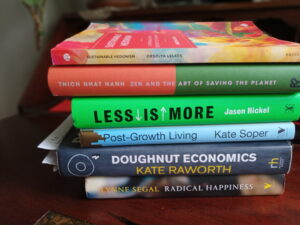In May, we launched our new Vision, Mission and Values for the Network of Wellbeing – to inspire us, clarify our purpose and guide our decision-making. Now, in a series of blog posts, we plan to share the thinking behind these texts. We want to start with some of the reading that has informed and stimulated us. We hope this will also offer you some ideas for reading if you’re relaxing over the summer!
 Many and varied are the journeys that have led us to the vision we share today – a world where people and the planet thrive together – and our mission to connect people, support projects and inspire action for the wellbeing of people and the planet. Each of the NOW team has been inspired by particular texts that mean something special to us.
Many and varied are the journeys that have led us to the vision we share today – a world where people and the planet thrive together – and our mission to connect people, support projects and inspire action for the wellbeing of people and the planet. Each of the NOW team has been inspired by particular texts that mean something special to us.
Here we’ve selected seven books, out of many others, as particularly pertinent today, in the hope that they will inspire you also.
- Active Hope: how to face the mess we’re in without going crazy by Joanna Macy and Chris Johnstone shares reasons for hope in a rapidly changing world. They explain that hope isn’t about wishful thinking, but about taking action towards the world that we’d like to see. This has been a big inspiration for our Hope in Action event series with Resurgence, during which Chris Johnstone has been one of our guest speakers. This book has recently been re-published for its 10 year anniversary, and we look forward to reading the new edition!
- Doughnut Economics – Seven ways to think like a twenty first century economist by Kate Raworth outlines how failures in economic thinking lie at the heart of the intersecting crises we face – and shows how a different approach to economics can enable us all to thrive together.
- Kate Soper’s Post-growth living: for an alternative hedonism makes “an urgent plea for a new vision of the good life, one capable of detaching happiness from the idea of continued economic expansion. She calls for renewed emphasis on pleasures of life that are currently denied, and shows the way to creating fairer and more fulfilling ways of living and working”. This resonates strongly across our work at NOW.
- Jason Hickell’s Less is more: how degrowth will save the world takes a long view of human development and argues for “an economy that’s more just, more caring and more fun. An economy that enables human flourishing while reversing ecological breakdown” and that “by taking less, we can become more”. You can see that this type of thinking has informed our work on projects such as the Share Shed.
- Orsolya Lelkes Sustainable Hedonism: a thriving life that does not cost the Earth calls “on us to explore our collective and personal convictions about success and the good life”. Drawing on science and philosophy, it explores how we can “cultivate our skills for enjoying life without harming ourselves or others”.
- Thich Nhat Hanh’s Zen and the art of saving the planet shows “how mindfulness and the radical insights of Zen meditation can give us the strength and clarity to help create a regenerative world in which all life is respected”. This type of thinking helps to inform our work exploring the relationship between inner practices to support our wellbeing, such as mindfulness, can help strengthen actions we take to support collective, systemic and sustainable wellbeing in the world around us. It has been a big influence on the retreats that we are planning to host at our retreat centre, Eden Rise.
- Lynn Segal’s Radical Happiness: moments of collective joy” is “a passionate call to rediscover the political and emotional joy that emerges when we share our lives”. We are excited that Lynn will be a speaker at our upcoming event, Hope in Action: Practices to Help Us Change the World.
Have you read any of the books on this list, and what do you think of them? What other books would you add? Please share here in our Building Wellbeing Together Facebook group, where we regularly connect to share wellbeing resources, ideas and inspiration!
